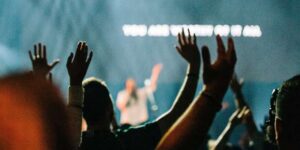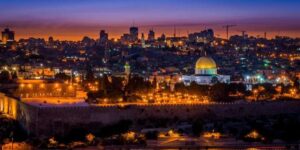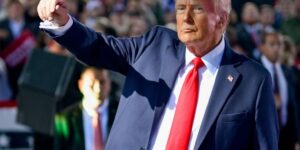Charisma Panel Discusses How COVID-19 Is Affecting Charismatic Churches and How to Respond With Courage, Not Fear
For 45 years, Charisma has been connecting the charismatic community and when there is a crisis, bringing together leading voices to give answers. From the televangelist scandals in the 1980s to concerns over attacks on religious liberties to racial reconciliation, we have tried to bring answers and give voice to concerns.
COVID-19 has made a dramatic impact on almost every aspect of American life. Jobs, health care, political positions and more have undergone sweeping changes in the wake of the coronavirus pandemic. Amid enforced closures, shifts to livestreamed services and arguments about reopening, churches have been hit hard as well.
To deal with how ministries and churches can respond both in local churches and national ministries, we gathered a panel of leaders on Zoom rather than in person due to the pandemic. This meeting was streamed via Facebook Live and recorded on this episode of my Strang Report podcast to discuss the present crisis, how the church is responding and what the future holds. I urge you to watch or listen and to share this far and wide.
As founding editor of Charisma, I convened the panel and invited leaders I know personally and respect and asked the questions I felt were needing answers. The participants included Mark Driscoll of The Trinity Church in Scottsdale, Arizona; Harry Jackson of Hope Christian Church in the Washington, D.C., area, presiding bishop of the International Communion of Evangelical Churches; Sam Rodriguez, pastor of New Season Christian Worship Center in Sacramento, California, and president of the National Hispanic Christian Leadership Conference; Eugene Smith, pastor of City Church in Sanford, Florida; and Benny Tate, pastor of Rock Springs Church in Milner, Georgia, and president of the Congregational Methodist Church.
This Present Darkness
Things may look different for the church than they did a few months ago, but the Charisma panel sees these challenges as opportunities for God to showcase His power. One of the first of these, said Tate, is isolation. Pointing to the creation story as evidence that God created man for relationship, he said, “Think about this. If a person’s in prison, what is the ultimate punishment? It’s solitary confinement. And what I’m trying to say to pastors is … we desperately do need to come together.” Tate said he told his church this past Sunday, “This is my fear. We’re going to miss so much church in America, that we no longer miss church.’
Driscoll agrees. “We were made by relationship; we’re made for relationship. And it is impossible to be emotionally, spiritually, mentally healthy unless you’re in relationship,” he said. He and the other pastors in his area have noticed “an uptick in depression. We’re seeing self-medicating at really record numbers.” Recalling the iconic toilet paper shortage, he asked his local grocer, “What is everybody buying now?” and got a simple answer: “Alcohol. They can’t keep alcohol on the shelf.”
And the isolation bleeds into other areas, explained Smith. He said the “free time” people had in lockdown helped heighten responses to tragedies such as the murder of George Floyd and has created a climate where “people are afraid to speak out, people are afraid to voice their opinions.” In his own multicultural church, located in the city where Trayvon Martin lost his life in 2012, Smith has provided an open forum for discussion on issues of race. “It’s definitely brought conversation to the table that I didn’t know was there.”
Jackson said that today, “all the problems of race—the need for the church to be healed, build bridges, come together—have manifested. But it’s manifest not just in police brutality, but also in response to COVID.” He pointed to a historical event the enemy has used to plant seeds of fear. “The Tuskegee Institute was used to do experimental testing on sexually transmitted diseases many, many years ago in the 20th century, and there is an amazing conspiracy theory among many Blacks in America that this disease, COVID, is really aiming to take a lot of us out,” he said. “So you’ll see that many Black churches are not trying to open up quickly. They feel like, ‘Why should our members die?'”
Although Jackson believes religious liberty is essential, he said for many in the Black community, “This is not this is not about religious liberty, then; it’s about social protection and medical protection. And there are all kinds of underlying health care issues.” He also suggested practical solutions with the church at the center. “We have a clinic in South Africa, for example, that sees 2100 people … a day for COVID. And we’re feeding folk …. And so what I’m finding is maybe community clinics could help in the U.S.”
Jackson said his new book, A Manifesto: Christian America’s Contract With Minorities, puts forth the idea that “there needs to be an agenda for race in America. … We can heal this problem. But we’re going to have to make sure that we don’t lump all of this into just a religious liberty argument. … We’ll have to unpack the nuances with different demographic groups.”
First-Amendment Rights
The pastors of the Charisma panel serve under a wide range of government restrictions and freedoms, the most prominent of which no doubt involve the recent headlines given to Howard-Browne after his March 30 arrest. He said he had no option but to defy Florida’s church-closure laws because, as a missionary and naturalized U.S. citizen from South Africa, “I raised my hand to pledge to defend the Constitution …. So I understand the power of the First Amendment. No. 2, I had done everything to secure my property with machines that kill everything [including] coronavirus; we social distanced.”
Howard-Browne said that within three days of his release, “Everything was reversed or charges dropped. And the sheriff who arrested me is now my friend. We talk all the time. … There is no local government or a governor who can supersede the Constitution.”
Smith, who also pastors in Florida, thanked Howard-Browne for “leading the pack. Because immediately after he did what he did, our governor came out and said that churches were essential,” Smith said. “And that really helped steel the spine of a lot of pastors in our community.”
Some other pastors faced fewer struggles in this area. Tate said, “We have a governor, Brian Kemp, who when COVID came into existence, did something unique. He called many other pastors and me to come to the state capital and have a time of prayer to pray for our state during this time. And so I commend him for that. He’s been supportive toward us being able to have church in Georgia, and we’ve done just that.”
Driscoll shares a similar climate of religious freedom in his state of Arizona. “We have a governor who seems to be a Christian. And he had the attorney general very early put out a very public statement stating that churches were essential services,” Driscoll said. “So just like you’d walk into Costco or Walmart or Sam’s Club or Home Depot and see a lot of people, churches were declared an essential service and also covered by the First Amendment. So it was double protection.”
But Rodriquez faces unique challenge in hyperregulated California, where Gov. Gavin Newsom has gone so far as to order churches to stop gathering for worship and Bible studies. “We’re not allowed to sing and chant. I kid you not, through executive decree,” he said. “So we can’t gather physically; we can only gather outside of our property, outside. With all the CDC recommendations [that] we have no qualms with.”
And the struggle has increased, Rodriguez said. “In the past 72 hours, one more threat emerged. Here it is: If you do gather together, government officials will come by and shut off your electricity. That’s the new threat. And you will be fined. You will be fined, you will be penalized, and you may be in prison. … trampling on this is a complete de facto and de jure infringement of our God-given rights.”
Rodriguez hinted at deeper roots to the government’s restrictions than mere protective measures. “Is it a coincidence that the majority of governments that are very restrictive, infringing on our God-given constitutional rights to gather and religious liberty, is it a coincidence that a majority of them are part of the political persuasion that does not necessarily count Bible-believing Christians as a constituency?” he asked. “Could this be punitive? … Could they be punishing a group of people that do not necessarily turn out and vote for them?
“I think it’s morally reprehensible,” Rodriguez said. “And I think the church needs to stand up. Stop drinking the Kool-Aid.”
Difficult Decisions
But the panel of pastors does not believe all is lost. For now, they and their people are rising to meet the challenges as best they can under the direction of the Holy Spirit, which they all agree is key.
Howard-Browne, whose church had to shut down after his arrest because of what he said were “Eighty thousand death threats on our River Facebook page,” said even though he can legally open River Church, God took him in another direction. The Lord led him to “take a field and go and be live on the field every night, and to make a stand for my brothers and sisters like Sammy [Rodriguez] and other people in other parts of the world that can’t meet.”
Those who attend must sign waivers not to hold the church responsible if they contract the coronavirus, Howard-Browne explained. The church, which has now met for more than 70 nights straight, has seen healings and miracles multiply. “I travel through the bush in Africa [where there may be] four viruses at a time, from Ebola to yellow fever … I’ve prayed for many, many people, laid hands—we don’t think about it one time,” he said. “So why was I going to stop because of COVID-19? … Everybody’s afraid of dying, but we preach about heaven and hell and repentance and getting right with God.”
Still, Howard Browne said, “Each pastor has to make different decisions.” And although Jackson admires the fiery stance shared by his fellow pastors, he said, “We’re dealing with the fact that Washington, D.C. is the head of the snake of the spirit of anarchy and fear that’s trying to possess the land.”
But Jackson also sees God’s power at work. “I’m finding that even online, signs and wonders are happening. … Now, what I’m dealing with is the culture trying to spread that spirit of fear into all the people,” he said. As far as the First Amendment, he agrees with Rodriguez. “There needs to be a movement of us lifting our voices to say, ‘You can’t tell us what to do.’ We need to do it respectfully,” he said. “We need to do it in the spirit of MLK, nonviolent, but we need to do that.
“Money in many of our churches is up, commitment is there,” Jackson said. “But really what we’re trying to grapple with is what is the hybrid church going to look like in the future?”
In his less fearful, less restrictive area of Arizona, Driscoll also sees God at work. “We provided options. If you want to watch online, great; and we’re streaming more services than ever. … I believe in my people; I trust my people. … They know the Word of God; they are filled with the Spirit of God. I believe that they as adults can make decisions that are in their best interest. …. We are literally stronger than ever.”
Tate agrees. When it comes to pastoral leadership, he said, “You can delegate tasks, but you can’t delegate responsibility. … So the responsibility of the decision we make is on us.” Like the other churches, Tate’s Rock Springs Church offers attendance options. About COVID-19 protocol concerns, he said, “I have found [for] the people who are wanting to come back, that’s not the highest priority in their mind. They want to come back to church. They want to be in God’s house.”
Future and Hope
As the discussion ended, each pastor offered words of encouragement to others in the COVID-19 ministry trenches. Tate shared a reminder via a powerful quote from Thomas Edison: “In the middle of difficulty lies opportunity.”
Smith gave a strong focus statement for these volatile times: “People are not my enemy,” he said. “Political parties are not my enemy. People of different persuasions are not my enemy. People are the prize for the kingdom of God.”
And once again, Howard-Browne made the case for prayer. “I tell all the pastors, pray, ‘God, what do You want me to do?’ God will give you a solution, even in the midst of the most adverse circumstance. … God will give you a way through.”
Jackson also pointed to the fact that these turbulent times push us to seek refuge in God. “I believe the church will not be the same after COVID. It will not be the same because we are being pushed as the early church, in a sense, through persecution. And everywhere they ran in persecution, the gospel spread. They didn’t know that God had a strategic plan, that as they escaped the power of persecution, they ran into the purpose of God,” he said.
“So I believe we’re going to do that,” Jackson added. “I believe we’re going to have to amp up our prayer as we seek the face of God. I believe that the gospel is getting ready to move into a new dimension, but the election is going to matter.”
And Driscoll gave an impassioned plea to his fellow leaders. “Fear and courage are both contagious, and leaders have got to cast out the spirit of fear and welcome the Holy Spirit for courage. … If we care about human suffering, we have to care about the preaching of the gospel of Jesus Christ. Everyone is eventually going to die somehow from something,” he said. “And if we want to end human suffering, we need to preach Jesus loudly, boldly, publicly, unashamedly and consistently, because if we want to end suffering, eternal suffering is the worst suffering of all. That’s why the church and the gospel of Jesus Christ are absolutely essential, and every minister needs to have courage to proceed forward to preach the gospel.
“Because if not, people will not die of COVID, they will die of sin, and they will not just suffer, they’ll suffer the eternal flames of hell,” Driscoll said. “So we’ve got a very important job to do, and we cannot lose sight of it.”
Rodriguez closed out the Zoom session with equal fervor. For believers today, he said, “Silence is not an option. With the Holy Spirit, with truth and love, let us raise our voice. Let us tell Pharaoh, ‘Let my people go so they may worship.’ Let us tell Nebuchadnezzar. ‘We will not bow.’ And let us tell Herod, go tell that fox, ‘We’re going to continue to heal the sick, cast out demons, because on the third day, everything changes.'”
I encourage you to watch the entire video for more insights from our panel of pastors. I’d also like to encourage you to share this article, video and podcast with your pastor as well as your fellow church members and any family and friends who may have an interest. Our country faces a huge challenge, and that’s why I’ve devoted so much of my time to getting the truth out. I do this through our online platforms, where you’re reading this article, as well as through the books I’ve written: God and Donald Trump; Trump Aftershock; God, Trump and the 2020 Election; and my most recent book, God, Trump and COVID-19. You can find them all at stevestrangbooks.com, including some special offers just for readers and listeners like you. {eoa}






































